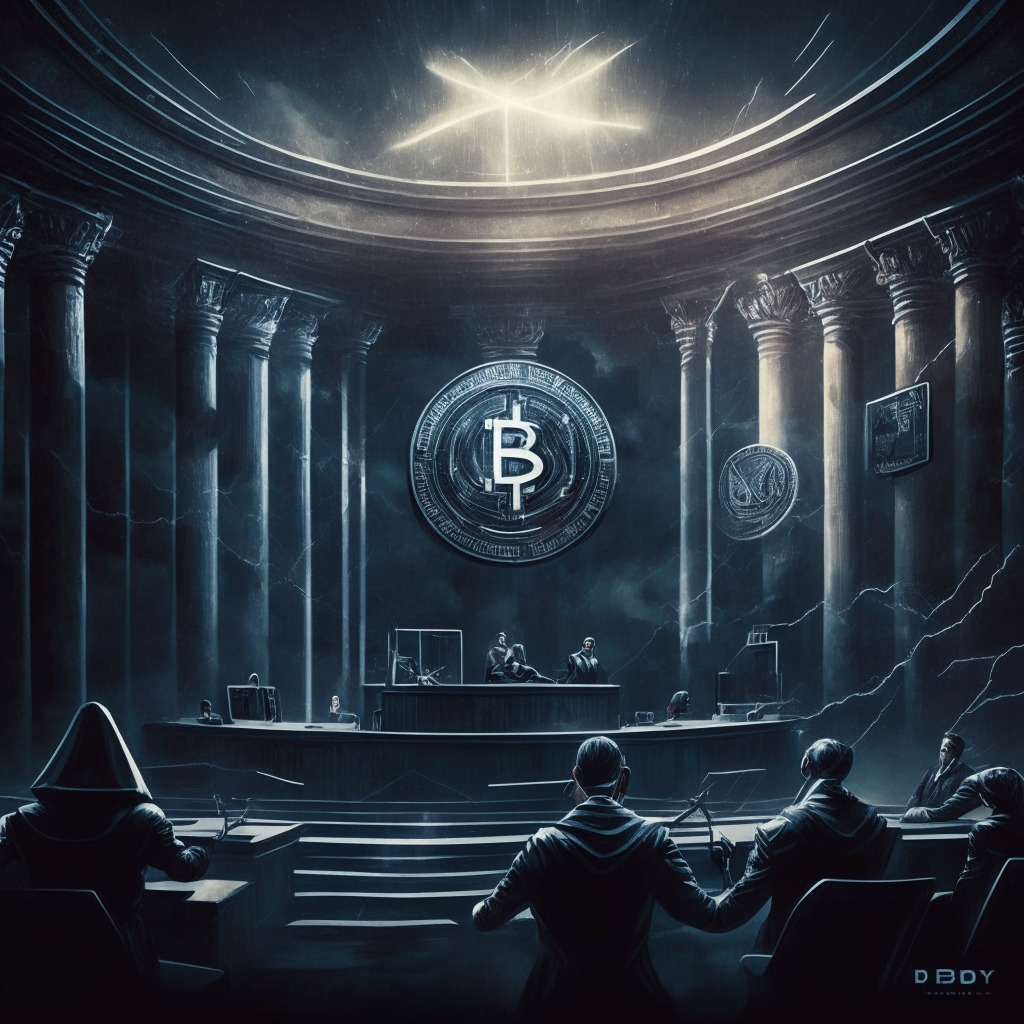Sotheby’s is hosting its largest-ever live auction of digital art, featuring NFTs from the bankrupt crypto hedge fund Three Arrows Capital’s “Grails” collection. The event highlights generative artists like Dmitri Cherniak and Tyler Hobbs, but raises questions about the uniqueness and value of algorithm-generated art in the rapidly growing market dominated by soaring prices.
Search Results for: Three Arrows Capital
Sotheby’s NFT Auction: Recouping 3AC Losses and the Future of Digital Art Assets
Sotheby’s auctioned rare NFTs from the Grails collection, initially owned by bankrupt crypto hedge fund Three Arrows Capital (3AC), yielding $2,482,850. The collection features generative art pieces and significant digital artworks, with more NFTs from 3AC’s collection to be sold in the future.
BlockFi Liquidation: Balancing Repayment and Uncertain Lawsuit Outcomes
BlockFi plans to liquidate its crypto lending platform to repay creditors, as revealed in a recent bankruptcy court document. Approximately 100,000 customers are among these creditors, with client recoveries hinging on the outcome of lawsuits against firms like FTX, Alameda, and Three Arrows Capital. This approach adds an element of uncertainty in potential client recoveries.
Singapore Court Ruling in BitMEX Feud: Restraining Orders, $6 Million Debt, and Crypto Regulation
A Singapore court grants a restraining order against BitMEX co-founder Arthur Hayes amidst an ongoing dispute with Three Arrows Capital co-founder Su Zhu. The unresolved $6 million debt central to the feud remains unaddressed, while the cryptocurrency market is reminded of the importance of operating within legal bounds and maintaining financial responsibility.
BitMEX Co-founder Faces Restraining Order: Exploring Social Media’s Role in Crypto Disputes
A restraining order has been issued against BitMEX co-founder Arthur Hayes due to his targeted Twitter posts concerning a $6 million dispute following the collapse of Three Arrows Capital (3AC). The case highlights the need for a balance between communication, regulation, and social media usage in the evolving crypto industry.
BitMEX Co-founder vs 3AC: Restraining Order & the $6M Debt Controversy in Crypto World
Su Zhu, co-founder of defunct crypto hedge fund Three Arrows Capital, obtains restraining order against BitMEX co-founder Arthur Hayes amid claims Hayes is owed $6 million. The case emphasizes the importance of transparency, accountability, and maintaining ethical standards in the crypto industry.
CFTC Eyes Former Voyager CEO: Disruption in Crypto Industry or Need for Stronger Regulation?
“The Enforcement Division of the U.S. Commodity Futures Trading Commission (CFTC) may charge ex-CEO of Voyager, Stephen Ehrlich, over a suspected ICO scam. Ehrlich allegedly violated CFTC regulations by not ensuring their customers’ assets’ security. The CFTC is contemplating imposing fines and other non-criminal penalties.”
Blockchain Meets Traditional Finance: A Tale of Progress and Caution from Hong Kong Stock Exchange
The Hong Kong Stock Exchange (HKEX) is integrating blockchain technology via a new platform, “Synapse,” using smart contracts to enhance operational efficiency in financial markets. However, the growing adoption of blockchain also highlights the urgent need for robust security measures and stronger oversight due to risks such as fraud.
Ardana Lab Debacle: A Tale of High Hopes, Poor Financial Management and Lost Investments
“Ardana Labs promised an innovative stablecoin platform for Cardano, however, the project collapsed due to alleged poor financial management. Xerberus’ analysis suggests Ardana’s executives may have misused project funds, leading to a $4 million loss, emphasizing the inherent risks in new-age Web3 startups.”
The Volatility Conundrum: Genesis Crypto Lending Halts Trading Amid Regulatory Challenges
Genesis, a crypto lending firm, has halted its crypto trading services citing business reasons. This move underlines the volatile nature of the crypto market and the strain it puts on trading platforms. Despite recent issues, the dedication to innovation in turbulent times suggests a promising future for digital currency.
Surprising Shutdown of Genesis: A Wake-Up Call or Strategic Shift in Crypto Trading?
Genesis, a prominent player in the crypto-trading market, has halted all trading operations, affecting both US and international spot and derivatives trading. This closure indicates potential turbulence in the crypto-trading sphere or a strategic shift in company direction.
Crypto Exchange Rebrands Stir the Pot: Huobi Becomes HTX Amidst Market Confusion
“Huobi, a notable crypto exchange, is rebranding to HTX, leading to parallels with FTX, a defunct exchange, and sparking scrutiny. Despite suspicions, the company denies any legal troubles. Simultaneously, BNB Chain employs Optimization’s rollup technology for opBNB, aiming to enhance scalability and security.”
Bankruptcy and Redemption: Gemini Earn’s Potential Recovery amidst Crypto Market Turbulence
“A proposed remuneration deal for retail creditors of the Gemini Earn program promises a possible recovery of 95-110% of their claims. The payout is contingent on an agreement within diverse Genesis creditor groups and the final form of the agreement.”
High-Stakes Crypto Feud: The Winklevoss-DCG Saga and its Implications on the Blockchain Future
The feud between crypto tycoons Cameron Winklevoss and the Digital Currency Group (DCG) led by Barry Silbert, involving accusations of fraud and illicit activities, underscores the need for more transparency and impending stringent regulations in the crypto world.
Singapore Elections: Uncertainty Looms over Future of Blockchain and Crypto Regulation
“Singapore’s presidential elections with Tharman Shanmugaratnam at the helm raises questions about forthcoming digital assets and blockchain policies. Known for his cautious stance on cryptocurrencies, its impact on Singapore’s relatively open approach to cryptocurrencies is uncertain.”
Newly Elected Singapore President and His Challenging Influence on Crypto Regulations
Singapore’s new president, Tharman Shanmugaratnam, with past finance roles may reshape fintech policies. His views on cryptocurrency, from ‘slightly crazy’ to its potential significant role in finance, could impact Singapore’s crypto regulatory balance amidst the aftermath of local crypto establishments’ failures.
BlockFi Bankruptcy: Proposed Stablecoin Switch for Trade-Only Wallets and Legal Scuffles
Bankrupt crypto lender BlockFi has requested court approval to convert “trade-only” wallet assets into stablecoins for withdrawal. Accounting for less than half a percent of all BlockFi user wallets in the U.S., these include diverse digital currencies such as Bitcoin Cash, Algorand and Dogecoin. BlockFi aims to facilitate a comprehensive withdrawal process through this method.
A Court Win for Crypto ETFs: Triumph or Prelude to Turbulence?
“A federal appeals court, led by Circuit Judge Neomi Rao, mandated the U.S. Securities and Exchange Commission (SEC) review its decision to deny Grayscale Investments the right to convert its Grayscale Bitcoin Trust (GBTC) into an Exchange-Traded Fund (ETF). The victory raises questions over the public’s right to invest in cryptocurrency, and pushes against the SEC’s persistent resistance to Bitcoin ETFs. The cryptocurrency world continues to evolve rapidly, with a need for balance between access rights, safety, market volatility, and financial risks.”
BlockFi’s Redemption Saga: From ‘Trade Only’ Assets to Gemini Dollars and Patricia’s PTK Crisis
BlockFi’s saga continues as the company seeks court authorization to convert ‘trade only’ assets into stablecoins for user withdrawal. This move, supported by the Committee of BlockFi creditors, is part of efforts to return user funds. However, uncertainty remains due to debt and questionable plans. Similarly, Patricia crypto exchange faces skepticism over its debt token, Patricia Token (PTK). These situations highlight tension between trust, regulation, and innovation in the crypto world.
BlockFi’s Bankruptcy: A Tale of Turbulence, Recovery Efforts and Client Protection
Crypto lending firm, BlockFi, has faced financial turmoil and bankruptcy threats due to complications related to FTX-related matters. Despite the challenges, the firm remains committed to its clients, has undertaken a reorganization strategy to recoup funds, and strives for transparency in its ongoing hardships.
Dubai’s VARA Slaps $2.7 Million Fine on OPNX: A Call for Better Crypto Market Standards?
In a move to uphold industry standards, Dubai’s Virtual Assets Regulatory Authority (VARA) fined the co-founders of 3AC’s new crypto exchange venture, OPNX, $2.7m over a market offense. Absolution isn’t only debt-settling but respecting regulatory frameworks, with unpersistence risking further penalties and marketing the destination of the crypto ecosystem.
Coinbase Unveils Stand with Crypto Alliance: The Push for Unified Regulatory Clarity
Coinbase has launched Stand with Crypto Alliance, an independent non-profit seeking to advance the interests of the growing crypto community. Amid regulatory battles, this entity aims to rally the decentralized community towards legislation that shelters consumers and safeguards their crypto rights while fostering innovation. Coinbase’s move marks a significant shift towards legislative matters.
DCG and Gemini: Unraveling the Legal Brawl Shaping the Crypto Universe’s Future
The ongoing legal battle between Digital Currency Group (DCG) and Gemini centers around Gemini’s accusation that DCG provided misleading data concerning the financial health of Genesis, a DCG subsidiary. Gemini alleges that DCG’s false information led to Genesis’s billion-dollar financial shortfall and the collapse of its lending scheme, Gemini Earn. DCG defends that Gemini’s claims are misconstrued and aims for the lawsuit dismissal.
The LIBOR Lessons: What Cryptocurrency Can Learn from Past Financial Scandals
The transition from LIBOR to the Second Overnight Financing Rate highlights issues similar to those facing the crypto industry, including misconduct, corruption, and slow regulatory response. This shift has implications for crypto, like LIBOR, it enjoys minimal oversight over major players. With crypto’s rise as a top-performing asset, questions surface: Will crypto follow LIBOR’s path? Can the financial system include crypto in future reforms?
The SEC’s Covert Crusade Against US Crypto: Potential Collapse or Global Shift?
The U.S. Securities and Exchange Commission’s (SEC) changes in regulatory policies could be sabotaging the resurgence of the blockchain industry. The new rules, perceived by some as covert attempts to regulate crypto out of existence, have led to startups moving offshore and riskier investments for U.S. investors. The shift towards a more merit-based regulatory role by the SEC threatens to restrict financial open-source software and could disqualify operators like Fidelity Digital Assets from acting as custodians.
OPNX’s $30M Lifeline for Troubled Crypto Lender Hodlnaut: A Boon or a Road to Perdition?
Digital asset exchange OPNX is offering a $30 million lifeline to crypto lender Hodlnaut in the form of FLEX digital tokens, aiming to facilitate a partial creditor payout. However, regulatory scrutiny, especially from Dubai, could pose significant challenges to this rescue plan. With network’s financial status hanging in the balance, final outcomes remain uncertain for now.
The Troubled Future of Hodlnaut: Lifeline or Death Knell through OPNX’s Crypto Takeover Bid?
OPNX exchange has initiated a bid to acquire 75% of Singaporean cryptocurrency lender Hodlnaut, with a proposal to infuse $30 million in FLEX tokens. While this could help alleviate bankruptcy and credit payout issues, there’s scepticism about whether creditors will accept the deal.
Coinbase’s Trading Slump: A Sombre Wave or the Calm Before a Strong Rally?
“Leading U.S. crypto exchange Coinbase reveals a 70% drop in consumer trading volume due to decreasing market capitalization of cryptocurrencies, stable Bitcoin prices, and less opportunities for significant returns. Despite regulatory scrutiny and downtrend, Coinbase maintains an optimistic outlook, backed by reported increased Q2 revenue and reduced losses.”
BlockFi’s Bankruptcy Plan: A Beacon of Hope or Injustice in Disguise?
BlockFi’s bankruptcy reorganization continues with a disclosed goal to speed up creditor recoveries. Despite criticisms suggesting their plan lacks procedural fairness, the firm is optimistic. The deciding vote on their reorganization progress is forthcoming on September 11.
Navigating the Controversy: Worldcoin’s Retinal Scans Stir up Crypto Scepticism and Safety Debates
Worldcoin, a project aiming to authenticate users via retinal scans for a global digital currency, faces scrutiny over its biometric data collection methods from various European authorities concerned about potential user risk. Amidst this flak, Worldcoin is still attracting significant interest, exemplifying the ongoing conflict between fostering innovative growth and ensuring security in the crypto space.
Tether’s Rising Treasury Reserves: A Balancing Act between Expansion and Security
“Tether recently disclosed a Q2 attestation, revealing a $3.3 billion jump in its excess reserves. Despite raising market concerns due to increasing U.S. Treasury bill holdings, Tether maintains 100% reserves for USDT tokens and continues growing financially. Transparency around reinvested profits becomes key to investor confidence.”
Bankruptcy and Blockchain: FTX Vs Genesis Case Study & Its Impact on Crypto Regulation
The recent bankruptcy settlement between FTX exchange and Genesis crypto lender has sparked numerous conversations about the financial implications of blockchain technology and its regulations. This case highlights the need for a stronger, transparent regulatory framework for cryptocurrencies to ensure fair play whilst encouraging innovation.






























